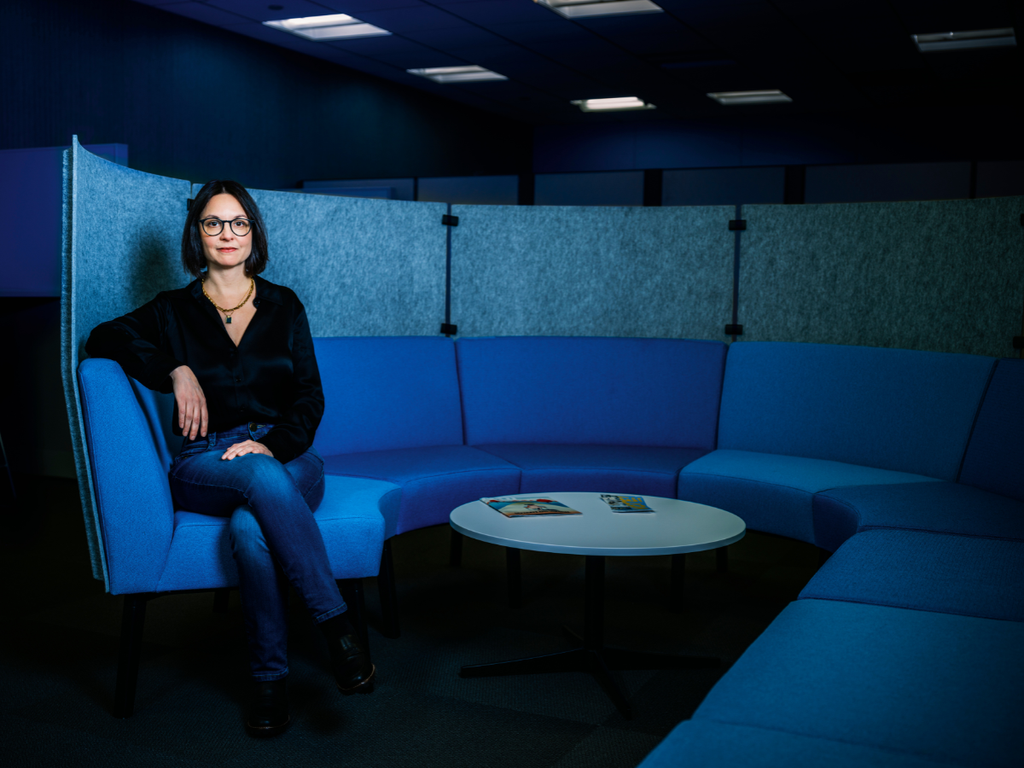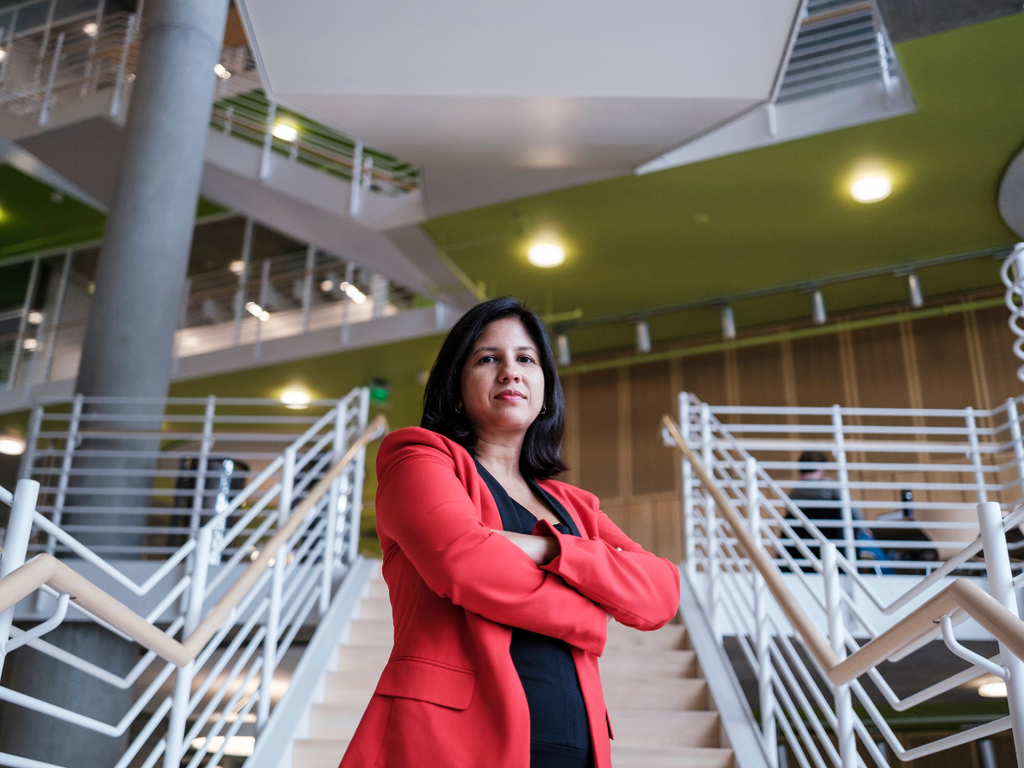Alumni Activists
BU Law alumni on the front line push for systemic change.

Photo by Chris Sorensen.
Alumni Activists
BU Law alumni on the front line push for systemic change.
In Spring 2020, the country was nearing the peak of the COVID lockdown, and American society had ground to a halt. But the police killing of George Floyd on March 25 spurred a wave of outrage and uprisings that shattered government- imposed quarantines and spilled into the streets. In New York City, thousands of people marched in protest, though a week of largely peaceful demonstrations was marred by episodes of looting and property damage. As tensions rose, the law enforcement response boiled over into violence.
JENN ROLNICK BORCHETTA (’04), then an attorney with a public defender nonprofit in the Bronx, remembers conducting intake with nonviolent protestors who had been surrounded by New York City police officers and beaten with batons. “People were very shaken,” she recalls. “The NYPD had plainly used excessive force. These were Black people, who were protesting the police murder of a Black man, being treated in such a way that was replicating what they were there to protest.”

An investigation by the Office of the Inspector General found that the NYPD had used “disproportionate” force and against “a wide swath of people who had no apparent connection to that potential criminal activity.” Borchetta represented 24 individuals injured by the NYPD response to protest in the Mott Haven neighborhood of the Bronx, the nation’s poorest congressional district. She and her team helped secure $1 million in compensation for their cohort of clients—called the Mott Haven Collective—and advocated for more investment in public mental health services for the Bronx community.
“These were people in the wake of something horrible putting themselves in the vulnerable position of having their trauma litigated,” she says. “They came together to prevent what happened to them from happening to anyone else. It was incredible to bear witness to that kind of commitment and strength.”
Speaking truth to power is woven into Borchetta’s family fabric. “We grew up with civil rights as a conversation around the dinner table,” she says. In the nineties, her mother, a community organizer, pushed for investigations into police use of racial profiling during traffic stops in Middlesex County, New Jersey.
Even as a law student, I could see the power of advocacy to change lives.
Borchetta’s interest in civil rights activism only deepened during her years at BU Law. “I was in my first month of law school when 9/11 happened,” she says, “so my class was having active conversations around both [security] threats and threats to our rights—the Patriot Act and limitations on civil rights and civil liberties—the sense of trauma and fear of rights being eroded was palpable.”
She was profoundly influenced by BU Law criminal procedure courses and the criminal defender clinic, where she successfully advocated for a minor to be tried as a juvenile rather than an adult. “Even as a law student, I could see the power of advocacy to change lives,” she recalls.
In 2009, while Borchetta was working with the Center for Constitutional Rights, she took on the federal class-action lawsuit that has defined her career. Floyd v. City of New York challenged the NYPD’s practice of racial profiling and aggressive stop-and-frisks of city residents. As senior counsel, she spent the next five years immersed in the case—building discovery, defeating a motion for summary judgment, and representing plaintiffs in a dramatic nine-week trial that called more than a hundred witnesses, from victims to prominent NYPD officials. The proceedings were closely watched by the press and public, who packed the courthouse each day.
In a momentous 2013 decision, a federal judge found the NYPD liable for a pattern of racial profiling and unconstitutional stops. Borchetta spent the following decade working closely with community groups, the NYPD, and a court-appointed monitor to reform the city’s policing tactics and officer training. Although Borchetta is quick to point out how much still needs to change, the significance of the Floyd verdict has been staggering. Prior to the ruling, the NYPD conducted hundreds of thousands of stop-and-frisks each year, peaking at 686,000 in 2011. Just one year after the trial, the number of stops plummeted to 46,000 and was last reported in 2023 at 17,000.
If we want to make meaningful change in civil rights, we need to build coalitions with community stakeholders and make sure our litigation is supporting wider efforts because, as attorneys, we can’t make this change in the silo of a single courtroom.
In her new role as deputy project director of the American Civil Liberties Union’s Criminal Law Reform Project, Borchetta’s primary focus is on developing legal strategies to advance individual rights and liberties and to challenge police abuse. “Over the last four years, we have seen greater awareness of racialized police violence and tremendous support for ending it,” she says. “But we’ve also learned that ending police abuse is really hard to do. There is no one solution. Going forward, there has to be continued pressure for accountability, because when that pressure lets up, the misconduct begins to rise again.”
Borchetta’s work centers on increasing legal protections in pedestrian and traffic stops, pushing back against racial profiling, and preventing excessive force. She wants to see greater investment in alternate safety models—such as sending trained mental health responders to mental health crises—and more support for poverty-stricken communities.
At the core of Borchetta’s approach is a deep respect for the experiences and perspectives of those who have suffered police abuse. “It would be a mistake to think that any community in America is a monolith,” she says. “We need to listen to the people impacted by police violence. If we want to make meaningful change in civil rights, we need to build coalitions with community stakeholders and make sure our litigation is supporting wider efforts because, as attorneys, we can’t make this change in the silo of a single courtroom.”
Preventing the Policing of Families

Police brutality wasn’t the only social justice cause to gain traction during the COVID pandemic. Nationwide school closures brought renewed attention to the country’s child welfare system, particularly its reliance on mandated reporters—primarily law enforcement, healthcare and social service providers, and educators—who are required by law to disclose suspected child abuse or neglect to authorities.
In recent years, fierce debate has swirled around the question of whether mandated reporting does more harm than good. Educational personnel account for the second-largest percentage of calls to Child Protective Services (CPS), but a 2023 analysis of statistics from the National Child Abuse and Neglect Data System shows their allegations are the least-often substantiated.
School shutdowns during the pandemic set the stage for an unplanned experiment. With stressed-out parents and kids learning remotely—no longer under the daily supervision of teachers—would child abuse increase unchecked? Many child advocates feared the worst.
However, post-pandemic statistics revealed a different story. Calls to CPS fell precipitously, but other metrics of child abuse—child emergency room visits and hospital admissions for abusive head traumas—also declined dramatically.
To child welfare scholar SHANTA TRIVEDI (’08), the data came as no surprise. For years, Trivedi, a family law professor at the University of Baltimore, has been part of a vocal coalition advocating for a full repeal of the Child Abuse Prevention and Treatment Act (CAPTA), a federal law intended to address child mistreatment. She says that rather than supporting children’s safety, health, and well-being, CAPTA allocates three-quarters of its $141 million budget to child welfare agencies that “surveil, investigate, and separate families.”
“There’s no evidence that mandated reporting works,” she says. “These calls usually don’t turn up the alleged abuse, but what does happen is it introduces CPS into the lives of families in a very intrusive way, creating a destructive cycle of punishment and judgment far beyond the initial concern.”
This can include stringent interventions that amount to what Trivedi calls “family policing”—and, like traditional policing, these interventions disproportionately affect low- income families of color. Extensive research shows persistent racial disparities in CPS involvement with Black and white children. More than half of all Black children—compared to 28 percent of white children—will be the subject of a CPS investigation before they turn 18.
We are openly having a conversation about racism in the family policing system in a way that we simply weren’t a few years ago.
One positive result of the pandemic, Trivedi says, is that the public now sees the parallels between the Black Lives Matter movement and calls to end family policing. “We are openly having a conversation about racism in the family policing system in a way that we simply weren’t a few years ago,” she says.
Trivedi argues that CPS calls often trigger a cascade of punitive measures that can cause irreparable damage to families. For instance, a teacher may report that a child has been coming to school hungry, with the intention of helping the family access needed services. However, “once CPS opens an investigation, they can make announced and unannounced home visits. Unlike a criminal case, there’s no warrant requirement,” Trivedi says. Investigators can search anywhere in a home, interview children without their parents present, and even inspect a child’s body for bruises whether or not physical abuse was alleged. Parents may be forced to submit to drug testing even if there is no suspicion of drug use.
Parents who work long hours or have limited childcare options may be penalized for missing mandatory parenting classes or therapy sessions. Or they can be required to show they have stable employment or housing—things that may not be within their control. “The threat that the kids could be removed is ever present and used to force compliance,” Trivedi explains. “And now, because of this oversurveillance, CPS has a whole new set of allegations that have nothing to do with the original concern but rather become about whether or not the parent is doing the things on the agency’s checklists.”
Short of the repeal of CAPTA, Trivedi hopes to see funding shift from surveillance to community-based programming designed to help families in crisis. “We need to build up communities to be well because so many of the problems that lead to people getting into the [child welfare] system are based on poverty and a subjective determination of neglect,” she says.
In addition to her teaching and advocacy work, Trivedi has authored papers on the detriments of taking children from their parents and placing them in foster care. She supports repealing the Adoption and Safe Families Act, which gives the state the power to permanently terminate parental rights if a child is in foster care for 15 out of 22 months. At a bare minimum, she wants to see a federal amendment to make it a consecutive 24-month timeline, with exceptions for incarceration, immigration detention, or substance use relapse.
“Being a parent is so hard, and I know I’m privileged,” she says. “I have the freedom to have a bad day and try to do better tomorrow. Other parents don’t have that freedom because the assumption is that they’re bad parents, and that can sometimes lead to them losing their children forever. There is no requirement in the law that you are a perfect parent. That might make people uncomfortable, but one person’s idea of what makes a good parent is shaped by their parents, community, religion, culture, and values. I’m dreaming of a society where every parent has the freedom to raise their children in a way that’s safe but also up to them.”